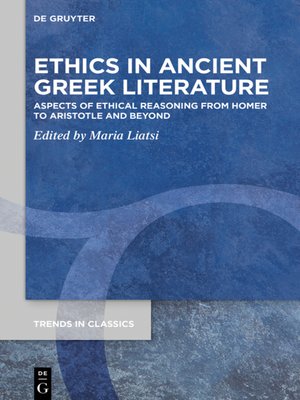Ethics in Ancient Greek Literature
ebook ∣ Aspects of Ethical Reasoning from Homer to Aristotle and Beyond · Trends in Classics--Supplementary Volumes
By Maria Liatsi

Sign up to save your library
With an OverDrive account, you can save your favorite libraries for at-a-glance information about availability. Find out more about OverDrive accounts.
Find this title in Libby, the library reading app by OverDrive.



Search for a digital library with this title
Title found at these libraries:
| Library Name | Distance |
|---|---|
| Loading... |
Interpretation of ancient Greek literature is often enough distorted by the preconceptions of modern times, especially on ancient morality. This is often equivalent to begging the question. If we think e.g. of aretê, which has different meanings in different contexts, we shall think in English (or in Modern Greek or in French or in German) and shall falsify the phenomena. If we are to understand the Greek concept e.g. of aretê we must study the nature of the situations in which it is applied. For it is an important fact in the study of Greek society that the Greeks used the one word (e.g. aretê) where we use different words. If we are to understand properly the texts, we have to view them in their historical and social context. Ancient Greek thought needs to be studied together with politics, ethics, and economic behaviour. Moreover, the best insights can be found in those who confine themselves to the terms of each ancient author's analysis. From this principle each of the contributions of the volume begins.







